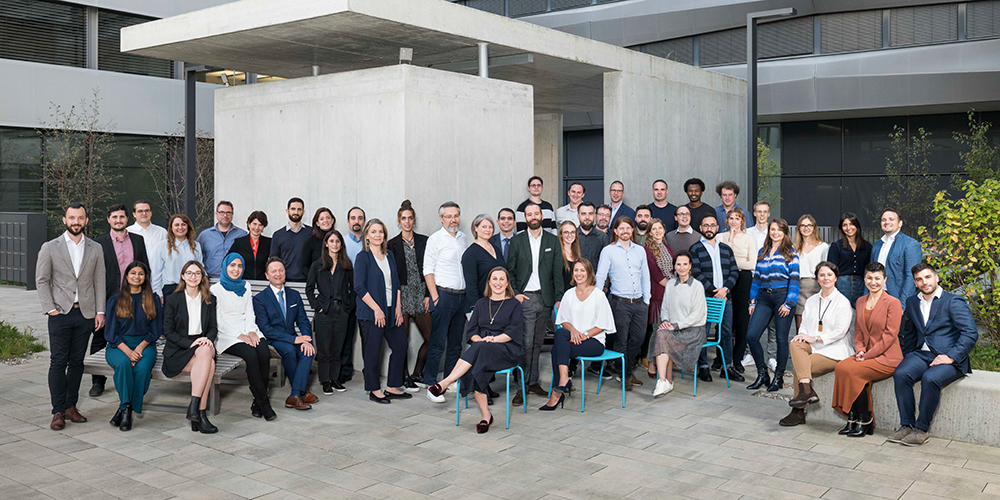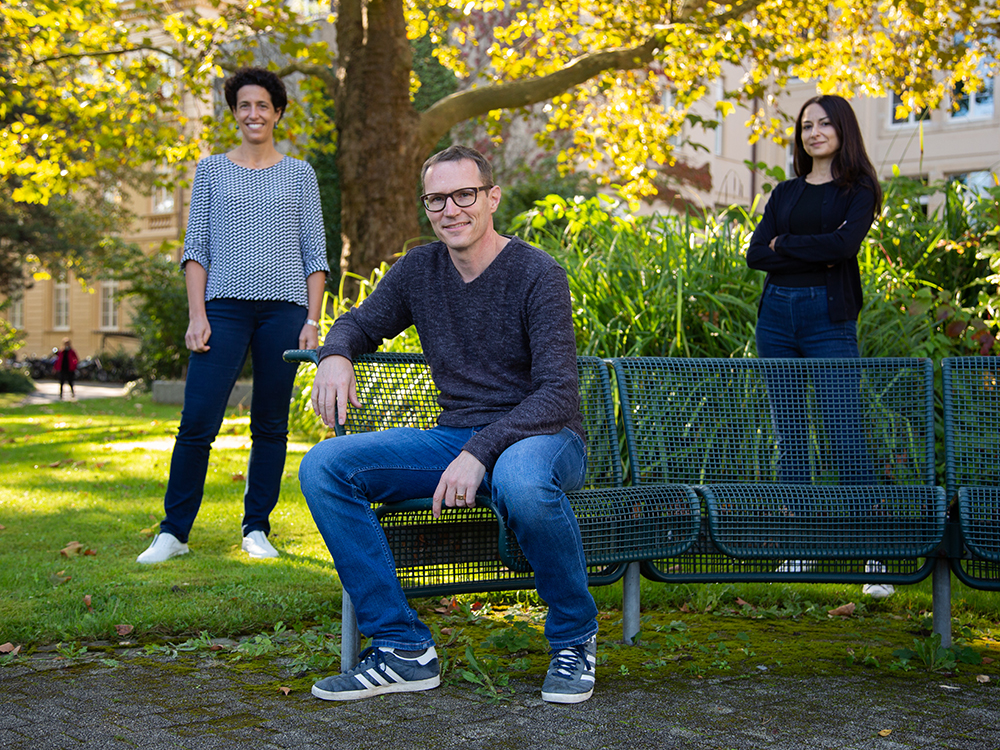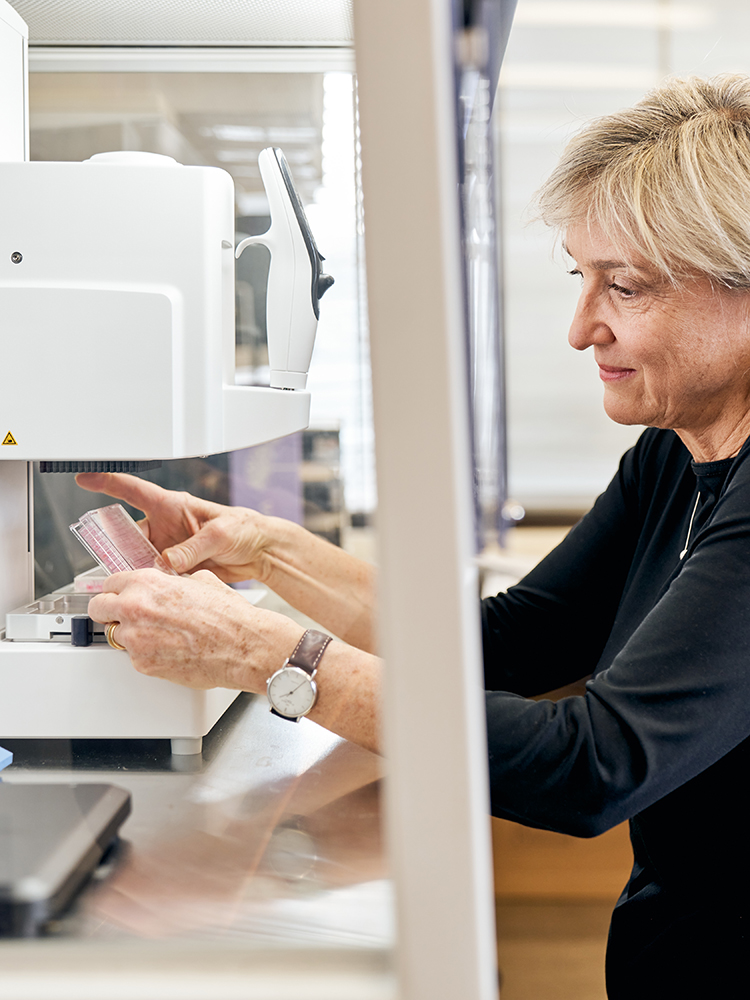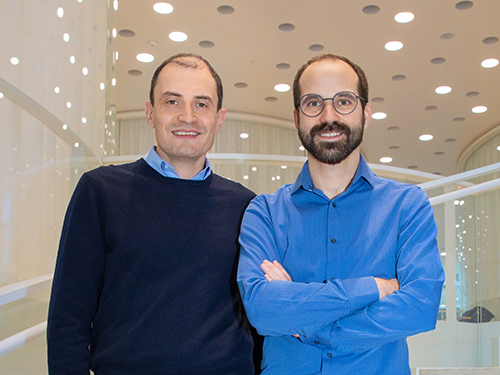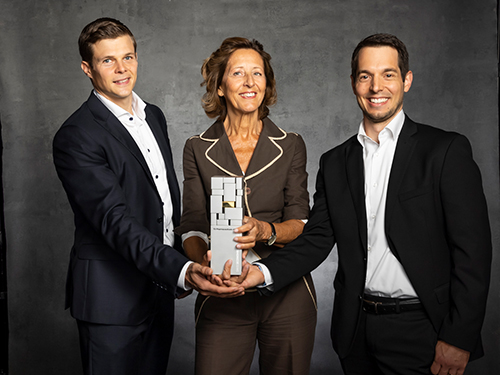Right on track for practical applications.
Text: Angelika Jacobs
An idea in the lab might someday help to improve cancer treatment. Five spin-offs from the University of Basel with the aim of developing concepts to benefit patients.
Faster diagnostics and treatment selection
When someone finds a lump in their breast and the mammogram identifies an abnormality, the next step is to biopsy and analyze the mutated tissue: Has the tumor been found early enough, or has it already spread? It takes a week on average to get the results of a biopsy – a week of fearful waiting for the patient and their relatives.
Marko Loparic, Marija Plodinec, Tobias Appenzeller and Philipp Oertle of the Biozentrum set up a spin-off in 2014 and have since been working on an approach that will return a result in just a few hours. An instrument scans the tissue sample with a tiny sensor, records its condition and uses this information to determine the status of the tumor. When a carcinoma begins to spread, cancer cells move through the body. To do so, they have to be particularly soft and flexible. This means that later-stage tumors and the directly adjacent tissue have different mechanical properties to those at an earlier stage. The instrument is able to measure and map this. The data allows physicians to predict the potential success of a cancer treatment with the aid of a newly developed platform.
In 2018, the spin-off evolved into the start-up Artidis (short for Automated and Reliable Tissue Diagnostics). The company is currently collecting data for the market approval of its new technology. Artidis has received around CHF 40 million in investments since 2018 and currently employs around 60 people.
Gentler cell therapies
There are great hopes that cell therapies will be able to combat some diseases that are currently hard to treat, including certain types of blood cancer. At present, treatment rests on the basic principle that hematopoietic stem cells (HSCs) and degenerate blood cancer cells are removed using radiotherapy and/or chemotherapy and replaced with new HSCs from a donor. This might sound simple, but the process is actually extremely hard on the patient. And if, for example, some degenerate cells manage to escape treatment, there is a chance that the patient could relapse. Radiotherapy or chemotherapy cannot be continued without also damaging the new, healthy cells.
Researchers at the Department Biomedizin founded the spin-off Cimeio Therapeutics in 2020, aiming to create a system that distinguishes between old and new HSCs and enables targeted and selective depletion of remaining tumor cells. Put simply, this means a gentler form of treatment: This approach allows the degenerate tumor cells to be gradually removed while the new blood cells take over the work and remain unaffected by the treatment. The Versant Ventures investment group is supporting the company with seed funding of USD 50 million. Cimeio has since grown to a team of around 30 and is working toward its first clinical trials.
Special unit to combat all tumor cells.
Researchers at the Department of Biomedizin, led by Gennaro De Libero and Lucia Mori, have made a discovery that could be the key to a new generation of efficient immunotherapies: A specific type of immune cell that recognizes and attacks degenerate cells based on the MR1 molecule. They have dubbed these immune cells “MR1 T cells”. Through their spin-off Matterhorn Biosciences – founded in 2019 with the aid of the venture capital company Versant Ventures – the researchers aim to develop these T cells into a tool that can be used to combat a wide range of cancers.
Current cell-based immunotherapies take up valuable time: Immune cells have to be removed from the patient and reprogrammed to recognize the tumor. The cells then have to be tested, propagated, prepared for infusion and injected back into the patient. One day, it might be possible to keep MR1 T cells in a refrigerator, ready to be applied to any cancer and anyone who needs them. The company has already received USD 40 million in seed funding and is expected to grow to around 50 employees by the end of 2023.
Fewer side effects
Aberrant regulation of cell growth plays a major role in cancer. In many forms of cancer, a growth signaling pathway remains permanently active when it shouldn’t. Although active agents are already available that inhibit this mTOR signaling pathway, they lack selectivity: The signaling pathway has two branches that may be overactivated to different extents depending on the type of cancer. Conventional active agents cannot distinguish between these two branches and thus can cause severe side effects.
In 2021, Stefan Imseng and Dritan Liko of the Biozentrum founded the spin-off Aukera Therapeutics to develop novel, more selective active therapeutics and thus to open up better treatment options for patients.
Bacteria to combat cancer
Research groups around the world aspire to find a way of targeting tumors with active agents, sparing the rest of a patient’s body. Researchers at the Biozentrum set up a spin-off, T3-Pharmaceuticals, to implement a promising approach: Certain bacteria possess something akin to built-in injection needles that they can use to inject proteins directly into human cells. Known as the type III secretion system, this is the core of the new cancer treatment. The research and development team at T3 Pharma has specifically altered bacteria so that they congregate and reproduce in solid tumors and produce certain proteins that directly inhibit cancer growth or indirectly curb growth by activating the immune system. The bacteria smuggle these therapeutic proteins directly into the tumor cells via their type III secretion system. A clinical study has been initiated successfully.
T3 Pharma was founded in 2015 as a spin-off from the Biozentrum and has since won numerous awards. The company has raised a total of CHF 40 million for the development of bacterial cancer treatment.
Entrepreneurship is new terrain for most researchers. The Innovation Office at the University of Basel supports them as they take their first steps, allowing them to turn promising approaches into successful new companies.
More articles in this issue of UNI NOVA (May 2023).

